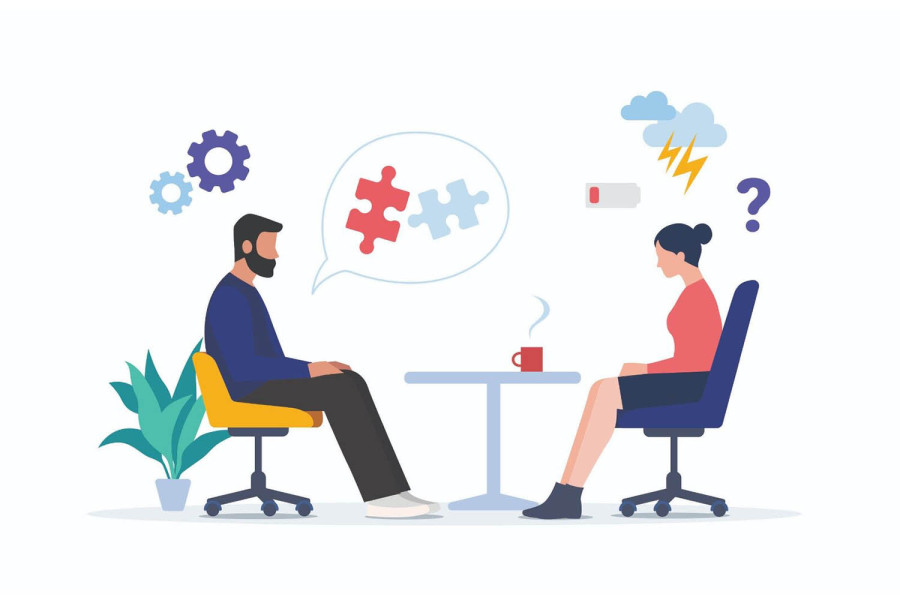Culture & Lifestyle
Choosing the right counsellor
Finding a counsellor can be overwhelming, but it is important to ensure they are qualified and the right fit for your needs.
Dipesh Tandukar
The journey to seek help is often challenging. People make this decision after much contemplation because, for many, it is a complex process. Asking for help starts with a realisation that something isn’t quite right, whether physically, emotionally, or mentally. This awareness comes after prolonged periods of struggle and overwhelming amounts of stress. Ultimately, it involves accepting that you can’t manage everything independently and that seeking help is necessary.
But what happens after this? How do you go about finding the right counsellor? Many individuals ask this question when they are ready to seek help. Unfortunately, this step is more tricky than it should be.
The most significant barrier they face is the stigma associated with mental health and not knowing whom to reach out to. In recent years, there has been an increase in individuals and organisations that provide counselling services, but the question stands: are these organisations and individuals qualified to offer such services?
On the one hand, the growing number of counsellors provides people with a wide array of choices, but on the other hand lies the problem: are these counsellors/ therapists/ psychologists credible? Can we trust their expertise and qualifications? Unfortunately, the answer isn’t always straightforward. Like everyone else, mental health professionals are humans and prone to make errors. This makes it essential for us to filter out what different counsellors might say because this field can potentially shape individuals’ lives.
Those seeking help and guidance are often influenced by the advice they receive. That is why we must ensure that the individuals we contact are competent enough to help us. In recent times, with the prominence of mental health as a field of study, there has been an increase in pseudo-psychologists—those individuals who have little knowledge but aren’t qualified to help.
Counselling is a collaborative process that requires trust, cooperation, and a good relationship between the counsellor and the client. Addressing the root of the issue often takes multiple sessions over many months. The case is terminated once the counsellor determines that the client can handle the stressors that were once troubling them. Therefore, it is necessary to be cautious of individuals who promise quick solutions or instant fixes. Counselling is not about fast results. It is a slow process of growth and healing.
The main thing you have to identify is why you are looking for a counsellor in the first place. Are you dealing with stress, anxiety, relationship issues, or simply looking for guidance in life? Different counsellors specialise in other areas. However, if you aren’t sure what the problem is in the first place, then choosing an experienced counsellor, someone who has been providing counselling services for a long time, might be a wise choice.
One of the most important factors in choosing a counselor is determining their qualifications and experience. Factors like whether or not they have a good educational background, or where they got their degrees in psychology or counseling from is very important. It is also necessary to check whether or not they are licensed and if they have had prior experience working in cases similar to yours. If they aren’t licensed, it is necessary to check whether or not they have a supervisor, preferably a clinical psychologist and how long they have been in the counselling field.
The most crucial aspect in determining the right counsellor is the genuineness he/she displays. While factors like their therapeutic approach matter, the sincerity in helping you is far more important. If you feel comforted, respected and understood by your counselor, then, as long as there is steady improvement, the counseling process is going the right way, however, if you feel as if the counselor isn’t really helping you and then you have all the right to change your counsellor. Granted that for a healthy relationship to develop between counsellor and client may take some time but the feeling of genuineness that is being displayed by the counselor is far more important.
Choosing the right counsellor can take time, especially with many organisations and individuals promoting themselves as the best option. So, it's important to explore all the alternatives available to you. Talk to people who have gone through counseling and get their opinions on different counselors. Avoid jumping on the bandwagon—make your own informed decisions. If you feel a counselor isn’t the right fit, don’t hesitate to seek another one. We have to look beyond all the promotions made on social media and actually look towards the types of counsellors; then, you can definitely tell whether or not he/she is the right counselor for you.
Tandukar is a mental health professional. He is an organisational psychologist at FHEAL, a counseling hub for mindful healing.




 22.65°C Kathmandu
22.65°C Kathmandu















